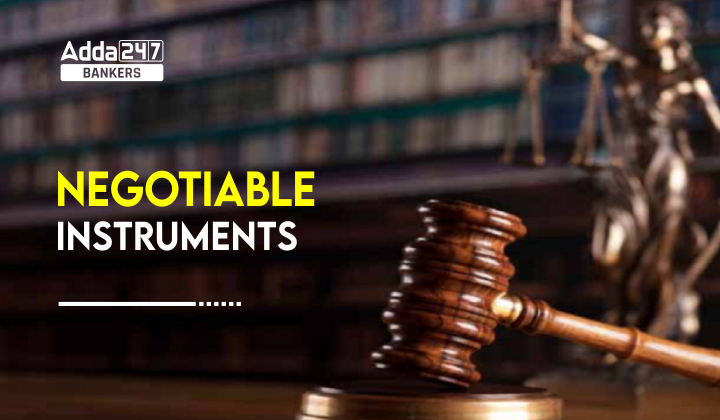Negotiable Instruments
Negotiable instruments are written agreements that allow for the transfer of their associated benefits from the original holder to a new party. These documents represent a promise of payment to either the person to whom they are assigned or a specified individual. They are transferable, signed documents that commit to paying the bearer or holder a certain sum of money upon demand or at a future date. Essentially, negotiable instruments are legally binding contracts that facilitate the exchange of value between parties through their transferability. In other words, Negotiable Instruments are generally signed legal papers or documents that guarantee to pay a certain amount to a party or an individual on a particular date. Negotiable Instruments can be considered an assurance for the assignee about the repayment. According to the nature or basis of the note, the document could include or exclude the name of the recipient.
Negotiable Instruments are designed to be transferable, allowing them to move from one party to another until they reach the rightful holder who can enforce their rights. In this context, we’ll delve into key facets of Negotiable Instruments, as they hold significant importance in the general awareness section of various competitive banking exams.
Understanding Negotiable Instruments
Negotiable instruments are designed to be transferable, enabling the holder to either claim the monetary value in cash or utilize them for facilitating various transactions. These documents encompass certain crucial details in addition to specifying the financial amount involved. As previously stated, once the funds are transferred to another party, the subsequent holder acquires legal ownership and title over the negotiable instrument. The transferability feature allows for the seamless exchange of these instruments, granting the new holder the rights and privileges associated with their possession.
What Is Negotiable Instruments Used For?
When we talk about Negotiable Instruments, it indicates a legal authority through papers or documents. It delivers a certain payment per the assignee’s requirements or a specific individual.
It is highly transferable, so the holder can grasp the funds as payment and then use it according to their convenience. Common examples of negotiable instruments include personal checks, cashier’s checks, money orders, certificates of deposit (CDs), promissory notes, and traveler’s checks etc.
Features of Negotiable Instruments In Banking Sector
Negotiable Instruments are a set of documents that holds a prominent range of traits. Here we will discuss some of the leading features of Negotiable Instruments that every candidate should understand who is willing to work in the banking sector.
- It is termed to be reliable and valid document that is transferable from one person to the other. Without any obstacles, the holder can transfer the document to any entity or person.
- The written legal document will be signed authentically by the issuer.
- After getting the Negotiable Instruments, the payee will enjoy complete ownership over the document.
- A negotiable instrument always mentions the payee’s name, which signifies making the payment to a specific person or firm.
- The Negotiable Instruments should always include the payee’s name and details as it will mention the authenticity of the payment and legal proof.
- You can get flexibility in the form of a payee as the transferable document is in your hand, and you can regulate it accordingly.
Advantages Of Negotiable Instruments?
- One of the leading benefits of using Negotiable Instruments is they can be transferred easily.
- To make such transfer, there is no requirement for excess formalities and extreme paperwork.
- Ownership of the Negotiable Instruments can be changed by delivering it to the other person in a legal format.
Types Of Negotiable Instruments
Negotiable Instruments are said to be one of the essential legal drafts that consist of a wide range of varieties. Some of the essential types of Negotiable Instruments have been listed here.
Promissory Notes
This type of Negotiable Instruments defines that one party or individual promises to give a certain amount to the other whose details have been mentioned over the note. This payment has to be completed on a particular date. This option is also termed as trade credit.
For example, A purchases from B INR 10,000 worth of goods. In case A is not able to pay for the purchases in cash, or doesn’t want to do so, he could give B a promissory note. It is A’s promise to pay B either on a specified date or on demand.
In another possibility, A might have a promissory note which is issued by C. He could endorse this note and give it to B and clear of his dues this way. However, the seller isn’t bound to accept the promissory note. The reputation of a buyer is of great importance to a seller in deciding whether to accept the promissory note or not.
Checks
A check is a type of note consisting of the amount given by one party to the other. The bearer’s account number and name will be mentioned in it whose money will be debited. This type of Negotiable Instruments is considered to be very safe and highly used.
Certificates of Deposit
Many financial organizations or any bank delivers a Certificate of Deposit considering it as a financial product. This Negotiable Instruments practice involves the customer’s deposition of a certain amount and maintain it safely for a fixed time frame. The customer will be provided with high interest rate in return.
Money Orders
Money Orders are basically termed to be a substitute of the checks used to make payments within a demand. To facilitate the money order the following payer has to give certain amount to the financial organization along with some processing fees.
Bearer Bonds
These Negotiable Instruments are known to be the unregistered bonds implemented by the Government or any corporate. As the name defines the bondholder will be offered a coupon and get the principal payment thereafter.
Negotiable Instruments Examples
Here we are listing out some prominent examples that will make you understand the Negotiable Instruments easily.
Example 1
Someone applied for certain amount of loan from a banking firm. The following bank will check the individual’s credit score and other relevant details to get the assurance of repayment. However, after getting the assurance also the bank will ask that individual to sign a promissory note which is a type of Negotiable Instruments.
Example 2
Many nations have been adopting the befitting features of Negotiable Instruments as this is becoming more ethical. Even India has adopted the Negotiable Instruments Act, 1881 to make the usage of these types profoundly.
Conclusion
Negotiable instruments play a vital role in fostering a healthy economic environment, as they provide businesses and organizations with the assurance of timely monetary repayments. This ethical practice serves as a crucial facilitator for seamless operations and financial transactions. Consequently, it becomes imperative for all individuals, including those aspiring for competitive examinations, to develop a comprehensive understanding of negotiable instruments and their significance in the broader economic landscape. Grasping the intricacies of these instruments not only enhances one’s knowledge but also highlights the importance of adherence to ethical practices that underpin the smooth functioning of commercial activities.





 GA Capsule for SBI Clerk Mains 2025, Dow...
GA Capsule for SBI Clerk Mains 2025, Dow...
 The Hindu Review October 2022: Download ...
The Hindu Review October 2022: Download ...
 IB ACIO 2025 Notification PDF Out for 37...
IB ACIO 2025 Notification PDF Out for 37...


